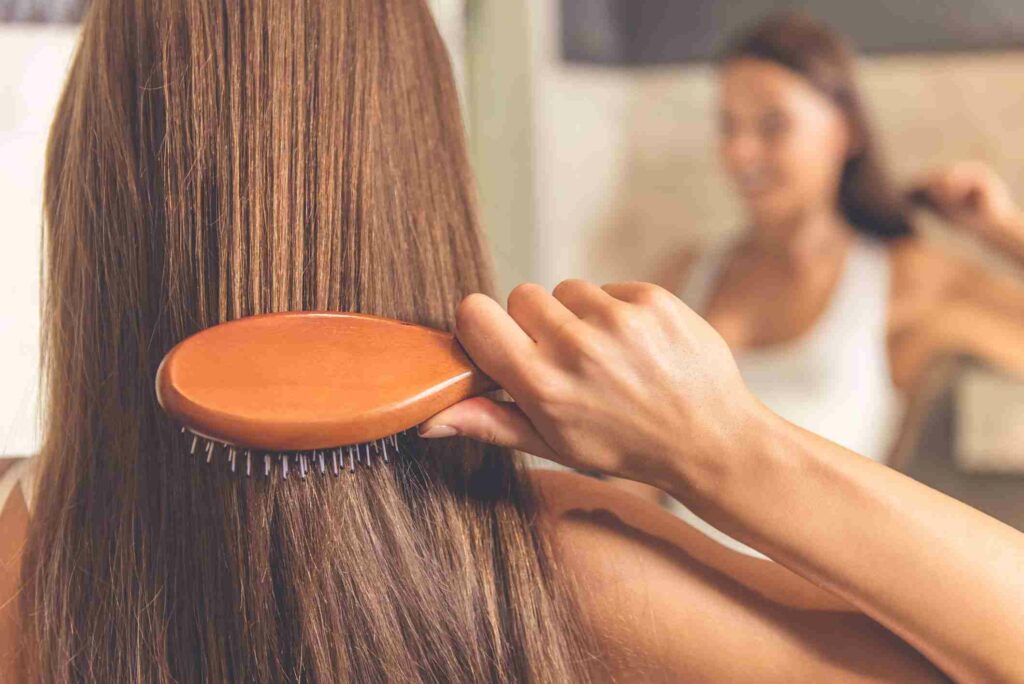Losing weight and hair are two of the most common concerns that people have. Unfortunately, many people do not know how to properly address these issues. In this blog post, we will discuss the relationship between weight loss and hair loss, and we will provide you with some tips on how to deal with each of these concerns.
Contents
Weight Loss And Hair Loss
 Many people believe that there is a direct correlation between weight loss and hair loss. However, this is not always the case. While it is true that some forms of hair loss can be caused by extreme weight loss, such as anorexia nervosa, this is not always the case. In fact, many people who are trying to lose weight may actually experience an increase in hair loss. This is because when you lose weight, your body goes into a state of shock and starts to shedding hair as a way to conserve energy.
Many people believe that there is a direct correlation between weight loss and hair loss. However, this is not always the case. While it is true that some forms of hair loss can be caused by extreme weight loss, such as anorexia nervosa, this is not always the case. In fact, many people who are trying to lose weight may actually experience an increase in hair loss. This is because when you lose weight, your body goes into a state of shock and starts to shedding hair as a way to conserve energy.
This type of hair loss is typically temporary and will stop once you have reached your goal weight. If you are concerned about the amount of hair you are losing, speak to your doctor or a qualified hair loss specialist.
The Connection Between Weight Loss And Hair Loss
There are a few different ways that weight loss can cause hair loss.
- First, as we mentioned above, extreme weight loss can lead to a condition called anorexia nervosa. Anorexia is an eating disorder that can cause your body to go into starvation mode. When this happens, your body will start to shed hair as a way to conserve energy.
- Another way that weight loss can cause hair loss is by causing your body to become deficient in certain nutrients. When you are not getting enough of the right nutrients, your body will start to shut down non-essential functions, like hair growth. This is why it is so important to make sure that you are eating a balanced diet and getting all of the nutrients that your body needs.
- Lastly, weight loss can cause hair loss by putting stress on your scalp. When you lose a lot of weight quickly, it can put a lot of strain on your scalp. This can lead to a condition called traction alopecia, which is when the hair follicles are pulled out from the roots.
These are just a few of the ways that weight loss can cause hair loss. If you are concerned about losing your hair, speak to your doctor or a qualified hair loss specialist.
Now that you know more about the relationship between weight loss and hair loss, you can start to take steps to deal with each of these concerns.
How To Deal With Weight Loss
If you are trying to lose weight, it is important to do so in a healthy way. You can do the following things to help you lose weight in a healthy way:
Eat a balanced diet
A balanced diet is an important part of any weight loss plan. You should make sure that you are eating a variety of healthy foods, including lean proteins, fruits, vegetables, and whole grains. It is also important to limit your intake of unhealthy foods, such as processed meats, sugary drinks, and refined carbohydrates. A typical balanced diet should consist of 30% protein, 30% fat, and 40% carbohydrates.
Get regular exercise
 Regular exercise is another important part of any weight loss plan. Exercise not only helps you to burn calories, but it also helps to boost your metabolism and build muscle mass. Muscle mass is important because it burns more calories than fat tissue. You can get regular exercise by joining a gym, taking up a sport, or simply going for walks on a regular basis. Just make sure that you are getting at least 30 minutes of exercise every day.
Regular exercise is another important part of any weight loss plan. Exercise not only helps you to burn calories, but it also helps to boost your metabolism and build muscle mass. Muscle mass is important because it burns more calories than fat tissue. You can get regular exercise by joining a gym, taking up a sport, or simply going for walks on a regular basis. Just make sure that you are getting at least 30 minutes of exercise every day.
Avoid crash diets or fad diets
Crash diets and fad diets are not effective ways to lose weight. These types of diet plans often involve eating very few calories, which can lead to nutrient deficiencies. Additionally, crash diets can also cause your metabolism to slow down, which can make it harder to lose weight in the long run. If you want to lose weight, it is best to do so in a slow and steady manner by following a healthy diet and exercise plan.
Drink plenty of water
Water is essential for many bodily functions, including weight loss. When you drink plenty of water, it helps to flush out toxins and excess water weight from your body. It is also important to drink water before meals, as it can help you to feel fuller and eat less. Aim to drink eight glasses of water per day. It is also a good idea to add some lemon to your water, as this can help to boost your metabolism.
Do not skip meals
Skipping meals is not an effective way to lose weight. When you skip meals, your body goes into starvation mode and starts to hold onto fat stores. This can make it harder to lose weight. It is best to eat three healthy meals per day and snacks in between if you are hungry. Try to avoid eating late at night, as this can lead to weight gain.
These are just a few tips to help you lose weight in a healthy way. If you are having trouble losing weight, speak to your doctor or a qualified nutritionist for more advice.
How To Deal With Hair Loss
Hair loss can be a difficult thing to deal with. If you are experiencing hair loss, there are a number of treatments that can help. These include:
Minoxidil
Hair loss can be treated with minoxidil, which is a topical solution that is applied to the scalp. Minoxidil can help to stimulate hair growth and slow down hair loss. It is available in both over-the-counter and prescription forms. It works by increasing blood flow to the scalp and by widening the hair follicles.
Finasteride
 Another option for treating hair loss is finasteride, which is a pill that is taken orally. Finasteride works by inhibiting the production of testosterone, which can help to prevent hair loss. It is available in both over-the-counter and prescription forms. You should speak to your doctor about which option is best for you.
Another option for treating hair loss is finasteride, which is a pill that is taken orally. Finasteride works by inhibiting the production of testosterone, which can help to prevent hair loss. It is available in both over-the-counter and prescription forms. You should speak to your doctor about which option is best for you.
Hair transplants
For some people, hair loss can be treated with hair transplants. This is a surgical procedure in which healthy hair follicles are taken from another part of the body and transplanted to the balding area. Hair transplants can be an effective way to treat hair loss, but they are usually only an option for people who have a small amount of hair loss.
Laser therapy
Laser therapy is another option for treating hair loss. This treatment involves using a low-level laser to stimulate hair growth. Laser therapy is available in both over-the-counter and prescription forms. It works by increasing blood flow to the scalp and by stimulating hair growth. You can choose to have laser therapy done in a professional setting or at home with an at-home device.
Dietary supplements
There are a number of dietary supplements that can help to promote hair growth and prevent hair loss. These include:
- Biotin: Biotin is a water-soluble vitamin that is found in foods like eggs, nuts, and beans. It is also available in supplement form. It works by helping the body to produce keratin, which is a protein that is essential for hair growth.
- Vitamin C: Vitamin C is an antioxidant that helps to protect the cells from damage. It is found in citrus fruits, dark leafy greens, and tomatoes. It also helps the body to absorb iron, which is necessary for hair growth.
- Vitamin E: Vitamin E is an antioxidant that helps to protect the cells from damage. It is found in vegetable oils, nuts, and seeds. Vitamin E also helps to keep the scalp healthy.
- Zinc: Zinc is a mineral that is necessary for cell growth and division. It is found in meat, poultry, seafood, and eggs. Zinc also helps the body to absorb vitamin A, which is necessary for hair growth.
If you are concerned about your hair loss, speak to your doctor or a qualified hair specialist. They will be able to recommend the best course of treatment for you.
You can also try the following tips to help reduce hair loss:
- Do not over-style your hair
- Avoid using harsh chemicals on your hair
- Use a mild shampoo and conditioner
- Do not brush your hair too harshly
- Wear a hat or scarf when outdoors
- Treat your hair gently
Whatever treatment you choose, it is important to be patient, as hair loss can take time to treat. In most cases, hair loss is a gradual process and it may take several months to see results. If you are not seeing results after six months of treatment, you may want to speak to your doctor about other options.
Common Approach To Treatment
There are a number of common approaches to treatment that can be used for both weight loss and hair loss. These include:
Diet
 Diet is a common approach to treatment for both conditions. Eating a healthy diet that is low in calories and fat can help you to lose weight as well as improve the health of your hair. Diet can also help to improve the appearance of your hair by providing it with the nutrients it needs to be healthy. Some healthy foods to eat for both conditions include:
Diet is a common approach to treatment for both conditions. Eating a healthy diet that is low in calories and fat can help you to lose weight as well as improve the health of your hair. Diet can also help to improve the appearance of your hair by providing it with the nutrients it needs to be healthy. Some healthy foods to eat for both conditions include:
- Complex carbs: Complex carbs are found in foods like whole wheat bread, brown rice, and oatmeal. They are a good source of energy and help to keep you feeling full.
- Fruits and vegetables: Fruits and vegetables are a good source of vitamins and minerals. They also contain antioxidants that can help to protect your cells from damage.
- Protein: Protein is necessary for the growth and repair of cells. It can be found in meat, poultry, fish, eggs, and beans.
- Healthy fats: Healthy fats are found in nuts, seeds, and fish. They help to keep your hair healthy and can also help you to lose weight.
Exercise
Exercise is another common approach to treatment for both conditions. It can help you to lose weight as well as improve the health of your hair. It can also help to increase blood flow to the scalp, which can promote hair growth. Some good exercises to try for both conditions include:
- Walking: Walking is a low-impact exercise that can help you to lose weight and also improve circulation which will eventually enhance the health of your hair.
- Running: Running is a good exercise for both conditions. It can help you to lose weight by burning calories as well as improve the blood flow to the scalp.
- Yoga: Yoga can help to improve the health of your hair as well as your overall wellbeing. You can try some yoga poses that are specifically designed to improve circulation to the scalp.
- Swimming: Swimming is also a great exercise for both conditions. It can help you to lose weight as well as improve circulation throughout the body.
Surgery
 Surgery is the most common approach to treatment for hair loss. There are a number of different surgical options that can be used to treat hair loss. These include:
Surgery is the most common approach to treatment for hair loss. There are a number of different surgical options that can be used to treat hair loss. These include:
- Hair transplants: Hair transplants are a type of surgery that is used to treat baldness. In this procedure, healthy hair follicles are taken from another part of the body and transplanted to the bald area.
- Scalp reduction: Scalp reduction is a type of surgery that is used to treat baldness. In this procedure, the skin on the scalp is removed and the remaining skin is pulled together.
Similarly, surgeries to treat weight loss are also common. These include:
- Gastric bypass surgery: Gastric bypass surgery is a type of surgery that is used to treat obesity. In this procedure, the stomach is made smaller so that less food can be consumed.
- Liposuction: Liposuction is a type of surgery that is used to remove fat from the body. This procedure can be used to treat both obesity and excess hair growth.
Treating both conditions can be a challenge, but it is important to remember that there are a number of options available to you. If you are not seeing results with one approach, try another. With patience and perseverance, you will eventually find the treatment that works best for you.
Conclusion
In conclusion, hair loss and weight loss can be linked. If you are experiencing hair loss, it is important to consult with a doctor to rule out any underlying medical conditions. If you are trying to lose weight, be sure to do so in a healthy way by eating a balanced diet and exercising regularly. Excessive or rapid weight loss can lead to hair loss, so it is important to be aware of this possible side effect.
Weight loss and hair loss are two common issues that many people struggle with. While they may seem unrelated, there is a connection between the two. Losing weight can cause hair loss, but there are ways to prevent and treat it. We hope this article has helped you better understand the link between hair loss and weight loss.
For more information on healthy and sustainable weight loss tips, you can choose to contact Mantra Care. We can help you develop a healthy weight loss program that is tailored to your specific needs and goals. You can also get in touch with our nutrition experts and expert dietitians through our online nutrition counseling, who can guide you through the process and help you achieve your fitness goals. Mantra Care is here to help you on your journey to a healthier, happier life! Contact us today to get started.


